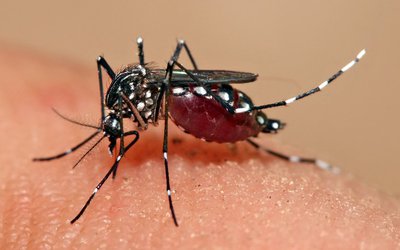
Dr. Manisha Rawal, director at Sukraraj Tropical and Infectious Disease Hospital (STIDH), informed 33 dengue patients are admitted to the hospital as of today and among them six are receiving treatment in the ICU.
With the spread of the virus in communities, major hospitals in the Kathmandu Valley have reported a surge in infected patients reports The Rising Nepal.
Around 110-140 patients are visiting the emergency department of the hospital on a daily basis and among them around 90 per cent are found to be infected with dengue, she added.
If the cases of dengue increase at the same rate, the hospital would face problem in managing the patients, said Dr. Rawal. The best way to prevent dengue is to destroy the mosquitos’ breeding sites, said Dr. Rawal.
According to doctors, mild to high fever, severe headache, muscle pain, rashes, pain in the eyes and vomiting are some of the symptoms of dengue.
In severe dengue cases, patients show additional symptoms including abdomen pain, vomiting, bleeding from gums and nose, vomiting blood and blood in stool, feeling tired and restless.
Dengue is transmitted by female Aedes aegypti or Aedes albopictus mosquito, after they bite a person.
The peak biting time of the mosquito is early in the morning and in the evening before dusk, said Dr. Bimal Sharma Chalise, Chief Consultant Physician at the STIDH.
Dr. Chalise suggested using insect repellent, wearing full-sleeve clothes, using mosquito net, and emptying possible mosquito breeding items that hold water.
Mosquitoes that cause dengue lay eggs in water-filled containers, inside and outside the house and infect people in daylight. Dengue-transmitting mosquitoes hatch when in contact with water, and can shelter in uncovered water tanks, buckets, discarded plastic cups, bottles and even tyres which hold water.
As the dengue cases are increasing alarmingly, community participation for ‘search and destroy’ is very essential, said Dr. Chuman Lal Das, director at the Epidemiology and Disease Control Division (EDCD).
It is very challenging to contain the spread of the disease as the dengue-spreading mosquitoes survive for up to 45 days.
A total of 3,227 cases of dengue have been reported within eight months in 72 districts this year, so far, according to the EDCD. Of them, more than 2,500 cases were detected within past two months reports The Rising Nepal.
- Russia launches one of its largest attacks against Ukraine
- Jul 06, 2025
- India notifies WTO of proposed retaliatory duties against US tariffs on autos
- Jul 06, 2025
- PM Oli Returns Home Attending UN FFD4 Summit
- Jul 05, 2025
- Trump signs into law domestic policy bill
- Jul 05, 2025
- Putin-Trump call after US halts some arms shipments to Ukraine
- Jul 04, 2025














